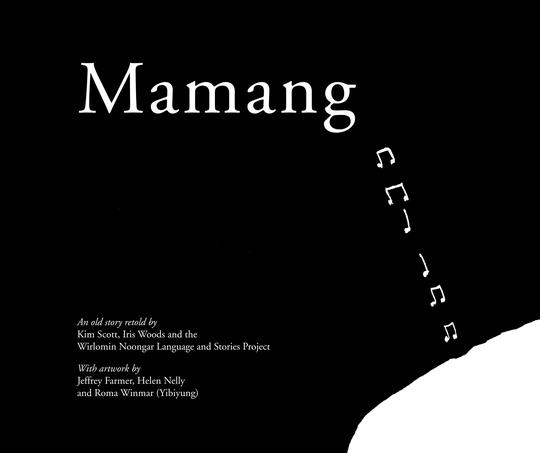A young man on the south coast of WA sees a whale, and jumps from a rock into the creature via its blowhole. They journey together: the man grabs and squeezes the whale from inside, and singing ‘to the rhythm of the whale’s big slow heartbeat.’ After a long time at sea, the whale beaches itself and the man emerges to tell two women he meets that he comes from ‘where the sun rises’. They all travel together to his home and the story ends ‘and that’s our home, now. And they our old people, unna?’
Each double spread has text on one side and a full colour painting on the right. The paintings are a naïve figurative style, which show both the man inside the belly of the whale and the view he gets from the blowhole, scanning the sea for land.
The text is in both Noongar language and two translations into English. The Noongar appears first, with literal English translation of each word or phrase underneath. This enables the reader of only English to feel the grammar and style of the original oral story. The story as picture book text (to be read aloud in English) appears at the bottom of the page.
The American linguist Gerhardt Laves recorded stories told to him by Noongar men Bob Roberts and Freddie Winmer at Albany Western Australia in 1931. Laves’ family returned the stories to Australia with his papers, fifty years later. AIATSIS has guardianship of them and worked with the University of Western Australia to bring them back to the Roberts and Winmer families. Along with other community members, Kim Scott and extensively workshopped the stories as part of the Noongar Language and Stories Project over several years, resulting in six published picture books.
An essay at the back of the book has more detail about the development of the stories into published form, including workshopping in local schools. A glossary is provided with this note: ‘We rely on the spelling conventions of the now defunct Noongar Language and Cultural Centre and Education Department of WA although dialect differences may make some of our choices unorthodox.’

